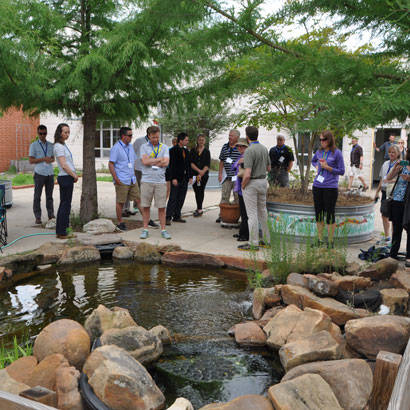
A group of more than 80 professionals from the fields of parks and recreation, early childhood development, public administration and other professions attending NRPA’s latest Innovation Lab sat raptly listening to a panel of five Latino teens from an Austin, Texas, high school describe the first time they felt really connected to nature, and the barriers they faced in their lives in doing so.
David Gonzalez spoke of the first time he really connected with nature. “I went to a park near where we lived and just sat down and listened to the birds and insects and sounds of nature — the running water of a nearby stream. I was lost in it, and suddenly, I realized it was already nighttime. I knew I had to get home or I was in big trouble!”
Jasmine Garcia said the first time she realized she really connected with nature was as a participant in an adventure recreation rock-climbing sponsored by the Austin Parks and Recreation Department. “I climbed to the very top of a rock face. I felt I had really accomplished something. I conquered my fears!”
Ellyssa Saldivar and Arleni Carreno discussed how many Latinos in their community didn’t know about parks near where they lived, didn’t have transportation to get to parks or felt discomfort about the idea of encountering “bees, bugs and other critters.” They spoke seriously of their friends who feared going to parks because of the chance they or members of their families might be questioned or “taken” by authorities.
These students from Akins High School are part of an innovative program that Austin Parks and Recreation Department conducts in cooperation with the Austin Independent School District, enabling teens to connect to potential career choices. The agency’s park ranger cadet program is a paid internship program for high school students who gain training in real-life job skills — talking to park visitors, presenting interpretive programs, learning how to budget for activities and other skills.
On the Cutting Edge of Innovation
NRPA’s Innovation Labs have established a reputation for high-quality, immersive experiences taking on challenging topics facing parks and recreation. The Austin Lab was presented in collaboration with the Children and Nature Network (C&NN) and the National League of Cities (NLC) Institute for Youth, Education and Families. C&NN and NLC are working jointly in a three-year program with seven cities to activate strategies that will develop green schoolyards, connect children and youth to nature during out-of-school time, and address the needs of underserved communities in developing better connections to nature for youth and families.
Lori Robertson, NRPA’s director of conservation, who led the team presenting the content of the Innovation Lab, said that there was a particular focus on the topic of creating equitable access to nature, especially for people in underserved communities. “Creating equitable access means focusing on those who have the least access to nature and those who are most in need,” she said.
Austin was an ideal location for this Innovation Lab because of the many strong partnerships and innovative programs for children and youth that take place there. The Texas Children and Nature Collaborative, the programs of Westcave Discovery Center and other public/private partnerships have flourished. One innovative setting on the banks of Lady Bird Lake is the Camacho Activity Center, which provides adventure recreation programming for youth, teens and seniors, including mountain biking, rock climbing, kayaking and film making. Teen participants in adventure programming produce videos and other creative arts, and their Totally Cool and Totally Art program has theater arts and other creative expression components. Attendees also toured Perez Elementary school, where there is an all-hands effort to connect kids to nature, providing a model of practice for green schoolyards.
Valuable Takeaways
The heart of this Innovation Lab centered on strategies for providing equitable access to nature for children and youth. Participants discussed how to foster new partners for out-of-school time activities, how to encourage policies that are applied across city departments, how to build health partnerships that can support policies and programs, and how to foster early childhood nature experiences that can lead to a lifetime love of nature.
Some of the discussion was informed by a recent study titled “The Nature of Americans,” by Dr. Stephen Kellert of Yale and DJ Case and Associates, which surveyed 12,000 children and parents about their access — or lack of access — to nature, and the barriers children and youth encounter to gaining the benefits that nature provides. Their major findings point to profound changes in the way Americans connect with nature. For many Americans, major barriers stand in the way of easy access to nature, and they found that one-time visits to distant nature places are not enough to instill a lifelong love of nature in children and youth, despite the growing body of knowledge that our human health not only benefits from contact with nature but may very well depend on it.
The Austin Innovation Lab addressed the challenges youth and adults face and attendees gained valuable knowledge and lessons learned from their peers. One of the most important takeaways was the recognition that a city that provides multiple ways for children and youth to connect with nature is a city that truly cares about its youth. Creating communities where health and wellness is a vital civic goal means providing equitable access to nature for all.
Richard J. Dolesh is NRPA’s Vice President of Strategic Initiatives.

